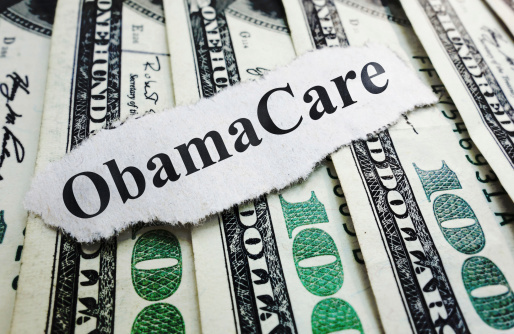Many lower- and middle-income Americans who purchased insurance on government-run health insurance exchanges are skipping needed tests and doctor’s visits, a new study has found.
The study, which was conducted by Families USA, titled “Non-Group Health Insurance: Many Insured Americans with High Out-of-Pocket Costs Forgo Needed Health Care” indicates high deductibles required by many health insurance plans offered through government health insurance exchanges discouraged one-in-four exchange customers from keeping doctor’s visits or getting important medical tests. The ratio was nearly one-in-three for middle- and lower-income adults.
More than half of plans offered in government exchanges have deductibles of at least $1,500.
“This is a clear example of how people can be very casual in their thoughts and language about rhetoric coming from the government about public programs,” said D. Eric Schansberg, an economics professor at Indiana University Southeast.
Schansberg says trust in government promises can result in people thinking they can get the care they need when they can’t.
Results Don’t Match Rhetoric
“Simply having health insurance is no guarantee that consumer can afford to pay for health care,” wrote the authors of the Families USA report.
Although the study’s results don’t prove these patients have worse access to care than before signing up for Obamacare, they certainly show the results don’t match the government’s rhetoric, Schansberg says.
“When government jumps in like it did with Obamacare, the benefits tend to be overstated, often by a significant amount,” Schansberg said. “The rhetoric surrounding implementation of the Affordable Care Act led these people to believe things would get better, but they haven’t.”
Barriers to Lower and Middle-income Americans
Families USA received $1.1 million from the Robert Wood Johnson Foundation after passage of Obamacare to encourage the newly insured to tell how President Barack Obama’s health care law personally benefited them.
The Families USA study ended up confirming millions of lower- and middle-income Americans who purchased plans on the exchange still can’t afford care, despite promises the subsidies and tax credits in the law would assist customers not only to purchase insurance but also to gain access to care.
“It is odd a group that lobbied for Obamacare claims Obamacare has delivered on its promise of making health care less expensive, despite evidence to the contrary, and then demonstrates that we cannot tax, subsidize, and mandate our way to affordable health care for everyone,” said Nathan A. Benefield, vice president of policy analysis at the Commonwealth Foundation, a free-market think tank in Harrisburg, Pennsylvania.
Calling for More Subsidies
To fix the problem, Family USA recommends reducing deductibles and copayments for lower- and middle-income Obamacare Silver Plan consumers.
“It is not surprising that they go on to advocate for still more government mandates and taxpayer subsidies,” said Benfield. “Government policy can expand the pool of Americans with health insurance cards, but it cannot guarantee lower costs. In fact, most government intervention into the health care field directly results in higher prices.”
The reality is the Affordable Care Act has not made health care any more affordable or accessible, Benefield says.
“The only way to achieve that is through actually having choice and competition in the health care industry,” Benefield said. “Choosing not to pay for additional medical services should be part of that. Simply asking taxpayers to pay more and taking choices out of the hands of patients will add to the total cost of health care and fail to address the underlying problems families struggle with.”
Doomed From the Start
The very existence of subsidies ensure failure from the beginning, says David Adams, president of Kentucky Citizens Judicial and a plaintiff in an ongoing legal battle to shut down the Commonwealth’s state-based exchange.
“The fact that they have to throw federal dollars to ameliorate what they’ve done to the pricing is your first clue that it’s a failure,” Adams said.
The reality for the lower- and middle-income Americans caught between the cracks of Medicaid and lacking the resources to cover much higher deductibles is Obamacare has blurred the distinction between insurance and actual access to care, says Adams.
“Of what benefit is it to have lower premiums if they have a $13,000 deductible and can’t afford basic treatment?” Adams asked. “You used to be able to go in to the doctor’s office and write a check for $50 to get a prescription. But now the price of everything is so distorted because of Obamacare so that even routine visits are out of reach for many of these people.”
Bruce Edward Walker ([email protected]) is a policy advisor for The Heartland Institute. Jim Waters ([email protected]) is president of the Bluegrass Institute, Kentucky’s free-market think tank.
Internet Info:
Families USA, “Non-Group Health Insurance: Many Insured Americans with High Out-of-Pocket Costs Forgo Needed Health Care”: https://heartland.org/policy-documents/non-group-health-insurance-many-insured-americans-high-out-pocket-costs-forgo-neede
Liz Hamel, Mira Norton, Larry Levitt, Gary Claxton, and Mollyann Brodie, “Survey of Non-Group Health Insurance Enrollees, Wave 2,” The Henry J. Kaiser Family Foundation: https://heartland.org/policy-documents/survey-non-group-health-insurance-enrollees-wave-2





